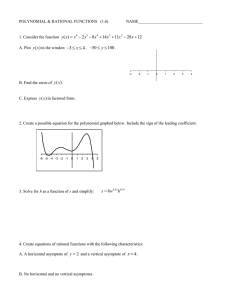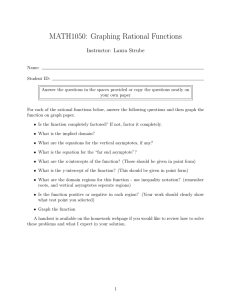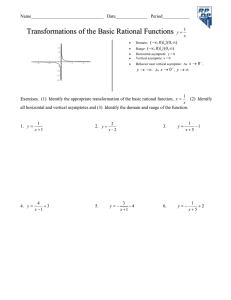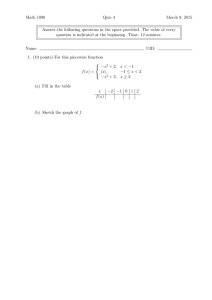Rational Functions: Domain, Intercepts, Asymptotes, Graphs
advertisement
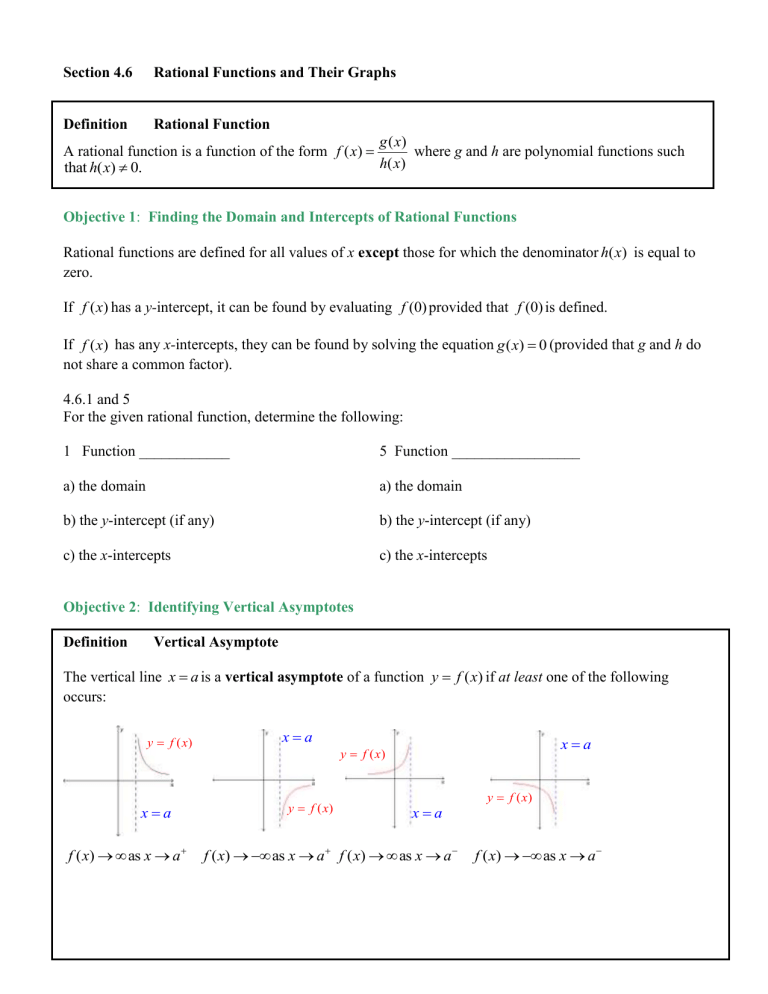
Section 4.6 Rational Functions and Their Graphs Definition Rational Function g ( x) A rational function is a function of the form f ( x) where g and h are polynomial functions such h( x ) that h( x) 0. Objective 1: Finding the Domain and Intercepts of Rational Functions Rational functions are defined for all values of x except those for which the denominator h( x) is equal to zero. If f ( x) has a y-intercept, it can be found by evaluating f (0) provided that f (0) is defined. If f ( x) has any x-intercepts, they can be found by solving the equation g ( x) 0 (provided that g and h do not share a common factor). 4.6.1 and 5 For the given rational function, determine the following: 1 Function ____________ 5 Function _________________ a) the domain a) the domain b) the y-intercept (if any) b) the y-intercept (if any) c) the x-intercepts c) the x-intercepts Objective 2: Identifying Vertical Asymptotes Definition Vertical Asymptote The vertical line x a is a vertical asymptote of a function y f ( x) if at least one of the following occurs: y f ( x) xa f ( x) as x a xa xa y f ( x) y f ( x) xa f ( x) as x a f ( x) as x a y f ( x) f ( x) as x a g ( x) where g ( x) and h( x) have no common factors will have a h( x ) vertical asymptote at x a if h(a) 0 . A rational function of the form f ( x) It is essential to cancel any common factors before locating the vertical asymptotes. If there is an x-intercept near the vertical asymptote, it is essential to choose a test value that is between the x-intercept and the vertical asymptote. 4.6.7 and 10 Find all vertical asymptotes and create a rough sketch of the graph near each asymptote. 7 The vertical asymptote is x = _____. 10 The vertical asymptote is x = _____. Objective 3: Identifying Horizontal Asymptotes Definition Horizontal Asymptote A horizontal line y H is a horizontal asymptote of a function f if the values of f ( x) approach some fixed number H as the values of x approach or . y 3 y f ( x) y2 y 1 y f ( x) y f ( x) The line y 1 is a horizontal asymptote because the values of as x approaches f ( x) approach 1 . The line y 3 is a horizontal asymptote because the values of as x approaches f ( x) approach 3 . The line y 2 is a horizontal asymptote because the values of as x approaches f ( x) approach 2 . Properties of Horizontal Asymptotes of Rational Functions Although a rational function can have many vertical asymptotes, it can have at most one horizontal asymptote. The graph of a rational function will never intersect a vertical asymptote but may intersect a horizontal asymptote. g ( x) A rational function f ( x) that is written in lowest terms (all common factors of the h( x ) numerator and denominator have been cancelled) will have a horizontal asymptote whenever the degree of h( x) is greater than or equal to the degree of g ( x) . Finding Horizontal Asymptotes of a Rational Function g ( x) an x n an1 x n1 an2 x n2 a1x a0 , an 0, bm 0 h( x) bm x m bm1 x m1 bm2 x m2 b1 x b0 where f is written in lowest terms, n is the degree of g , and m is the degree of h . Let f ( x) If m n , then y 0 is the horizontal asymptote. a If m n , then the horizontal asymptote is y n , the ratio of the leading coefficients. bm If m n , then there are no horizontal asymptotes. 4.6.16, 17, 14 Find the equation of all horizontal asymptotes (if any) of the rational function. 16 There is a horizontal asymptote at y = _______. 17 There is a horizontal asymptote at y = _______. 14 There is a horizontal asymptote at y = _______. Objective 4: Using Transformations to Sketch the Graphs of Rational Functions The graphs of f ( x ) 1 1 and f ( x ) 2 x x f ( x) f ( x) 1 f ( x) x Properties of the graph of f ( x ) Domain: ,0 0, ,0 0, 1 x Range: No intercepts Vertical Asymptote: x 0 Horizontal Asymptote: y 0 Odd function f ( x) f ( x) The graph is symmetric about the origin. 1 x2 1 x2 Properties of the graph of f ( x ) Domain: ,0 0, 1 x2 Range: 0, No intercepts Vertical Asymptote: x 0 Horizontal Asymptote: y 0 Even function f ( x) f ( x) The graph is symmetric about the y-axis. 4.6.21 and 26 Use transformations of f ( x ) 1 1 or f ( x ) 2 to sketch the rational function. Label all intercepts and find x x the equations of all asymptotes. 21 26 Objective 5: Sketching Rational Functions Having Removable Discontinuities g ( x) may sometimes have a “hole” in its graph. In calculus, these “holes” are h( x ) called removable discontinuities. Removable discontinuities occur when g ( x) and h( x) share a common factor. It is possible to have a rational function with a common factor in the numerator and denominator whose graph still looks like the graph of a rational function but has a “hole” in it. A rational function f ( x) 4.6.35 Identify the coordinates of all removable discontinuities and sketch the graph of the rational function. Objective 7: Sketching Rational Functions Steps for Graphing Rational Functions of the Form f ( x ) g( x ) h( x ) 1. Find the domain. 2. If g ( x) and h( x) have common factors, cancel all common factors determining the x-coordinates of any removable discontinuities and rewrite f in lowest terms. 3. Check for symmetry. If f ( x) f ( x) , then the graph of f ( x) is odd and thus symmetric about the origin. If f ( x) f ( x) , then the graph of f ( x) is even and thus symmetric about the y-axis. 4. Find the y-intercept by evaluating f (0) . 5. Find the x-intercepts by finding the zeros of the numerator of f, being careful to use the new numerator if a common factor has been removed. 6. Find the vertical asymptotes by finding the zeros of the denominator of f, being careful to use the new denominator if a common factor has been removed. Use test values to determine the behavior of the graph on each side of the vertical asymptotes. 7. Determine if the graph has any horizontal asymptotes. 8. Plot points, choosing values of x between each intercept and choosing values of x on either side of the all vertical asymptotes. 9. Complete the sketch. 4.6.43 and 45 Follow the nine-step graphing strategy to sketch the graph of the rational function. 43 45
